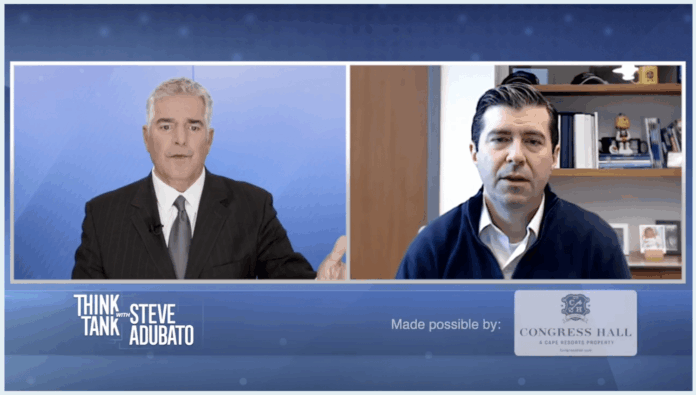When it comes to the future of New Jersey’s economy, challenges and opportunities often arrive hand in hand. Recently, broadcaster and thought leader Steve Adubato sat down with Tim Sullivan, CEO of the New Jersey Economic Development Authority (NJEDA), for an in-depth discussion about some of the biggest issues shaping the Garden State: tariffs, artificial intelligence, manufacturing, and the state’s childcare system.
Their conversation highlights the uncertainty of global trade, the potential of AI-driven innovation, and the critical importance of supporting working families through affordable childcare investments—all central pieces of New Jersey’s economic puzzle.
Explore more political and economic stories from across New Jersey here.
The Uncertainty of Tariffs
Global tariffs have long been a source of tension for businesses, and Sullivan acknowledged that unpredictability in trade policies continues to weigh heavily on New Jersey manufacturers and exporters.
- Impact on local businesses: Tariffs increase costs for companies that rely on imported raw materials, squeezing small and mid-sized manufacturers in particular.
- Ripple effect on consumers: Rising costs inevitably filter down to New Jersey residents, who face higher prices on everything from household goods to construction materials.
- Need for stability: Sullivan emphasized that while businesses can adapt to challenges, they need predictability and consistency in trade policy to plan, invest, and grow.
For a state with a long history of manufacturing and a strong position as a logistics hub, tariff uncertainty is more than a headline—it’s a daily concern for employers and workers alike.
Artificial Intelligence and Manufacturing
The conversation also turned to artificial intelligence (AI) and its role in shaping the next chapter of New Jersey’s economy. While AI is often discussed in terms of office work or big tech, Sullivan made it clear that manufacturing stands to gain significantly from AI-driven innovation.
- Boosting productivity: AI tools can streamline supply chains, improve efficiency on production lines, and reduce costly errors.
- Supporting workforce needs: With many industries facing labor shortages, AI can help manufacturers operate more effectively while still creating opportunities for skilled workers.
- Keeping NJ competitive: As neighboring states invest in advanced technology, New Jersey must ensure its manufacturing sector keeps pace to remain a national leader.
Sullivan described AI not as a replacement for human workers but as a tool to empower them, creating a more resilient and competitive economy.
Childcare as an Economic Driver
Perhaps the most pressing issue raised in the discussion was the role of childcare in New Jersey’s economy. Far from being a purely social concern, childcare is increasingly seen as a workforce necessity.
- Supporting working families: Without reliable, affordable childcare, parents—especially women—are often forced to step back from the workforce.
- Closing economic gaps: Investing in childcare helps reduce inequities by ensuring all families have access to the support they need to thrive.
- Driving growth: Sullivan emphasized that strengthening childcare infrastructure is one of the most effective ways to ensure long-term economic stability in New Jersey.
For the NJEDA, investing in childcare means investing in both the current workforce and the future workforce, as children benefit from safe, supportive early learning environments.
Balancing Challenges and Opportunities
From tariffs to technology to childcare, Sullivan framed the conversation around a single theme: resilience through strategic investment. While global trade tensions and economic uncertainty present undeniable challenges, New Jersey also has unique strengths to build on—its diverse workforce, robust infrastructure, and a government committed to forward-looking policies.
By embracing innovation through AI, addressing pressing family needs with childcare investment, and advocating for stability in trade, the NJEDA is working to ensure the state can weather global headwinds while continuing to grow at home.
Steve Adubato’s conversation with Tim Sullivan underscores how interconnected today’s economic issues truly are. Tariffs affect manufacturers and consumers alike, AI holds the promise of transformation across industries, and childcare remains a linchpin for family stability and workforce participation.
As New Jersey looks ahead, the path forward will require balancing these challenges while seizing opportunities for innovation and equity. With leaders like Sullivan steering the NJEDA, the Garden State is positioning itself not just to adapt—but to lead.
Stay informed on New Jersey’s political and economic landscape here.












